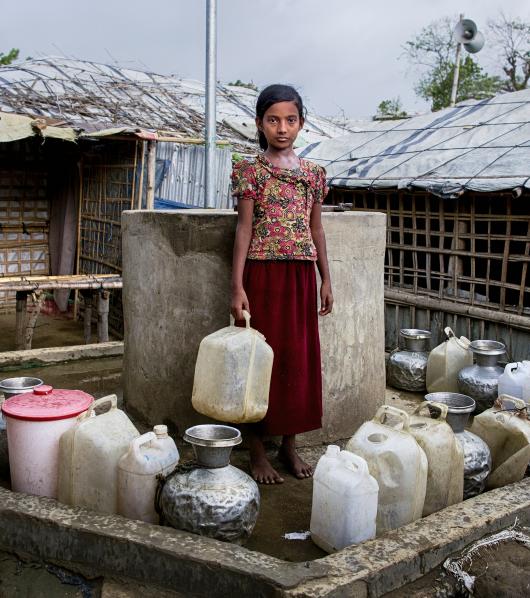
Our goal is to create a vibrant and equitable society across Bangladesh, where women and men are empowered, jointly exercising leadership and good governance towards building resilient communities.
Straddling in the fertile Ganges-Brahmaputra-Meghna (GBM) basin, Bangladesh is one of the world's most densely populated countries, with around 160 million people living in a land area of about 147,570 square kilometers. The landmass – largely a deltaic formation – coupled with climate change, makes it subject to catastrophic natural disasters. In particular, Bangladesh’s 600km coastline is one of the most disaster-prone regions in the world.
Poverty is deep and widespread in the country, with almost half of its population living on less than one dollar per day.
Oxfam in Bangladesh
Oxfam’s involvement in Bangladesh began in 1970, assisting the then cyclone victims, and supporting the people of Bangladesh during the 1971 Liberation War. Oxfam was one of only three organizations honored as a Friend of the Bangladesh Liberation War in 2012.
Our goal is to create a vibrant and equitable society across Bangladesh, where women and men are empowered, jointly exercising leadership and good governance towards building resilient communities.
We work with a wide range of partners that include civil society organizations, NGOs, media organizations, foreign and local universities, private sector companies, along with different levels of government. To have a significant impact on poverty and inequality, we recognize that by working with international and local civil society organizations, we can increase impact at scale and bring about transformative social change.
Influencing is a core part of how Oxfam and its partners work to achieve change at all levels. We take leverage from our development interventions and try innovative solutions and models to achieve lasting impact. We build capacity of different stakeholders, and mobilize people to make their voices heard. Guided by our evidence-based research, we campaign for strategic policy and practice change.
We mainstream gender in all our work. We influence to reduce gender-based violence and discrimination. We empower women and girls by ensuring transformative leadership and equal participation in society. We uphold sexual and reproductive rights. We do this, so that women and girls in Bangladesh will be able to enjoy the freedom to make meaningful decisions. We work with different networks and alliances at both local and national levels. We engage with public and private sectors in creating spaces for women and girls to have their own voice, make their own choices and take control of living their own lives.
We work to ensure that the most marginalized women and men in Bangladesh would be able to find their way out of poverty. We build capacity and provide opportunities for them, to be able to have secure and sustainable sources of income. We also build the capacity of both urban and rural communities, so that they would have the right tools and knowledge on how to build businesses that are resilient to economic shocks and stresses caused by climate change-related disasters.
Together with our partners, we work to reduce the sufferings and loss of lives of people living in disaster-prone areas in Bangladesh. We build people's capacity to rebuild their lives from disasters and make them better prepared for the next ones. We do this in an inclusive way — by operationalizing rapid, effective and gender-sensitive responses. In every response, our aim is to reduce negative impacts, and resume the livelihoods of affected communities through rapid long-term recovery, as well as enhancement of policies and practices of government and all humanitarian actors in the country.

Rohingya refugee crisis: Oxfam's response
Close to a million Rohingya people have fled violence in Myanmar to seek refuge across the border in Bangladesh. This unprecedented number of refugees has caused a large-scale humanitarian crisis. Oxfam is responding to this crisis. We are currently focusing on providing water and sanitation, food, and adapting to better deal with the crowded conditions and sheer numbers of people in the camps. (photo: Fabeha Monir/Oxfam)